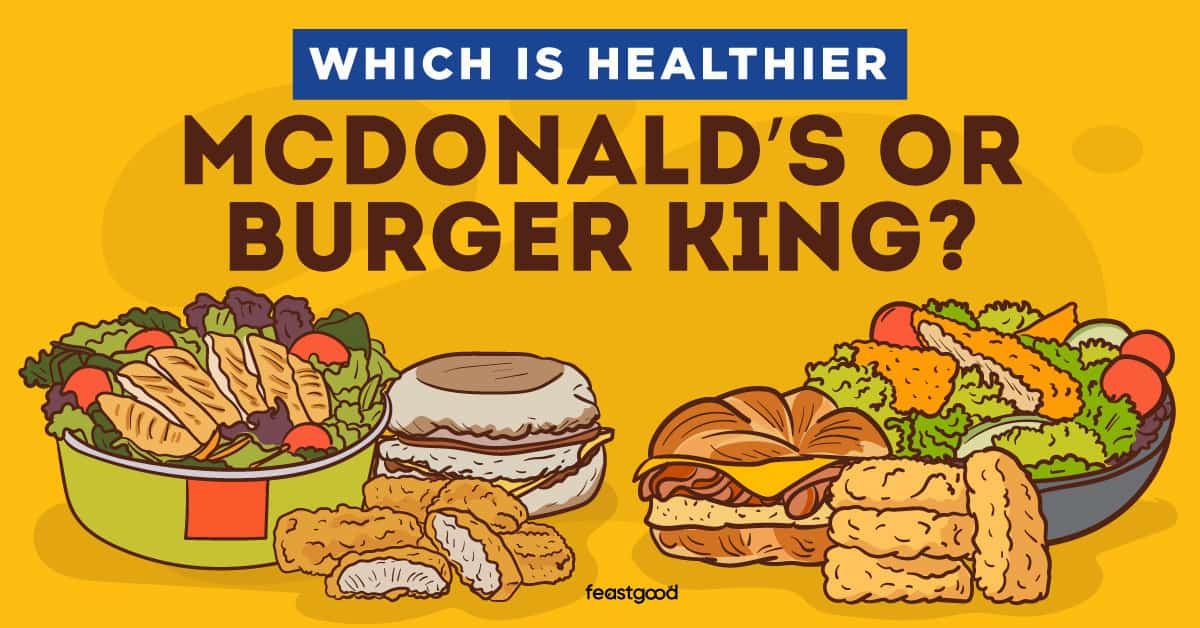If you’re trying to decide whether Mcdonald’s or Burger King is healthier, I’ve researched both menus extensively and give you my recommendation as a nutrition coach.
Is McDonald’s or Burger King healthier? McDonald’s is healthier than Burger King because McDonald’s meals are lower in calories, fat, and sodium than the meals at Burger King.
However, Burger King does have higher protein menu items (+5g on average) than McDonald’s.
The main criteria to consider when deciding whether McDonald’s or Burger King is healthier are:
- Can you find lower calorie options?
- Can you find meals high in protein and low/moderate in carbs and fat?
- Can you find meals that are lower in sodium?
- Can you customize meals for your specific nutrition goals?
In this article, I’ll show you how McDonald’s and Burger King stack up against each other based on these criteria so you can decide where to eat when you’re on the go.
McDonald’s vs. Burger King: Overview
McDonald’s
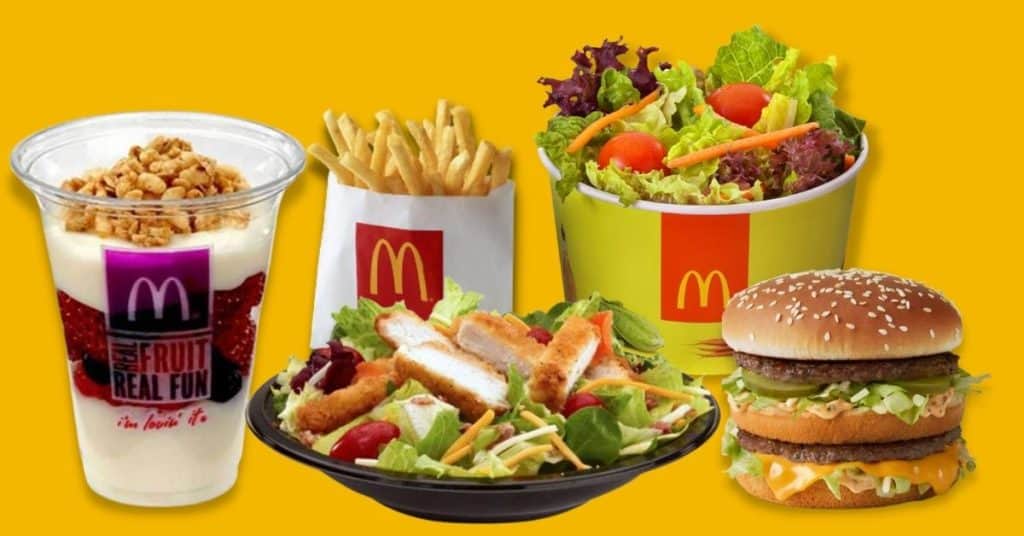
McDonald’s has a variety of menu items to choose from including breakfast options like sandwiches, bagels, muffins, and donuts; burgers made with beef, chicken, fish, and plant-based patties; and of course their iconic nuggets and fries.
McDonald’s also has eleven salads on their menu and side options like apple slices, which are good options for adding more fiber and micronutrients while you’re eating out.
I reviewed McDonald’s 22 main burger and sandwich options (beef, chicken and fish) in order to calculate the average nutritional information and here’s what I found:
The average nutritional information for the 22 main burger/sandwich options is 498 calories with 44g of carbs (2.9g fiber), 23.5g fat (7.5g saturated), 27.5g protein, and 1057mg of sodium.
Key Takeaway: McDonald’s burgers have 186 fewer calories than the average burger from Burger King. McDonald’s burgers also have less fat (-19g) and sodium (-95mg) than Burger King. However, the protein content of a McDonald’s Burger is 5 grams less than one from Burger King.
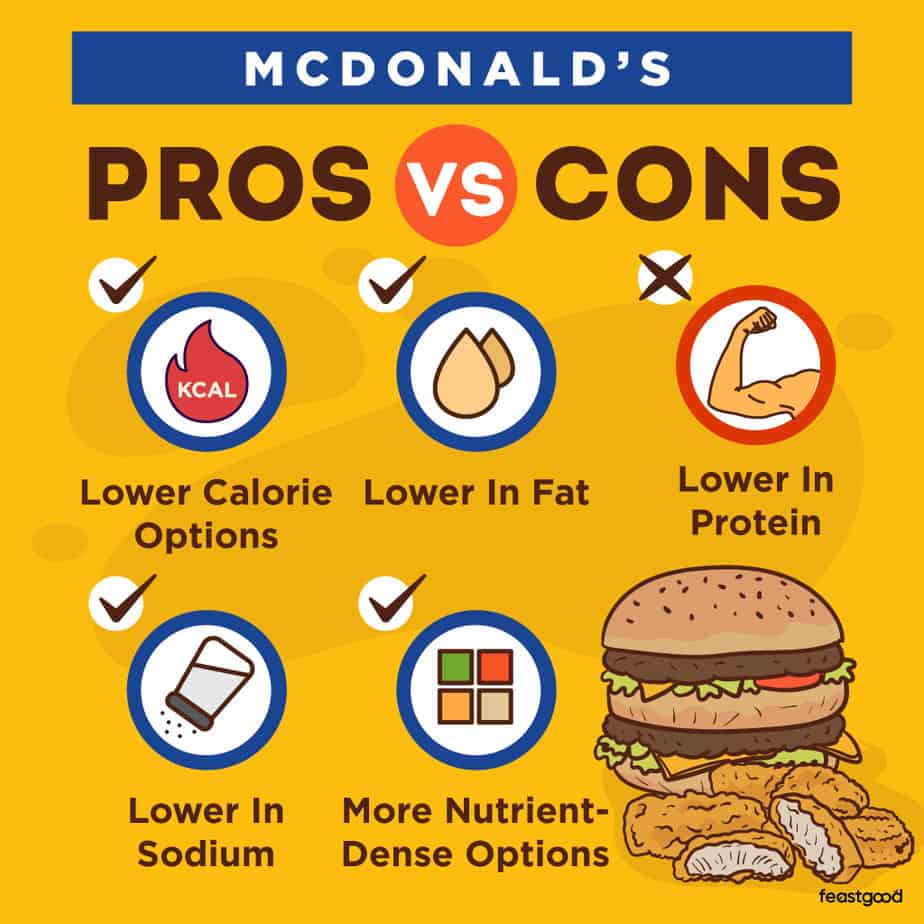
Pros
- Lower Calorie Options
- Lower In Fat
- Lower In Sodium
- More Nutrient-Dense Options
Cons
- Lower In Protein
Burger King
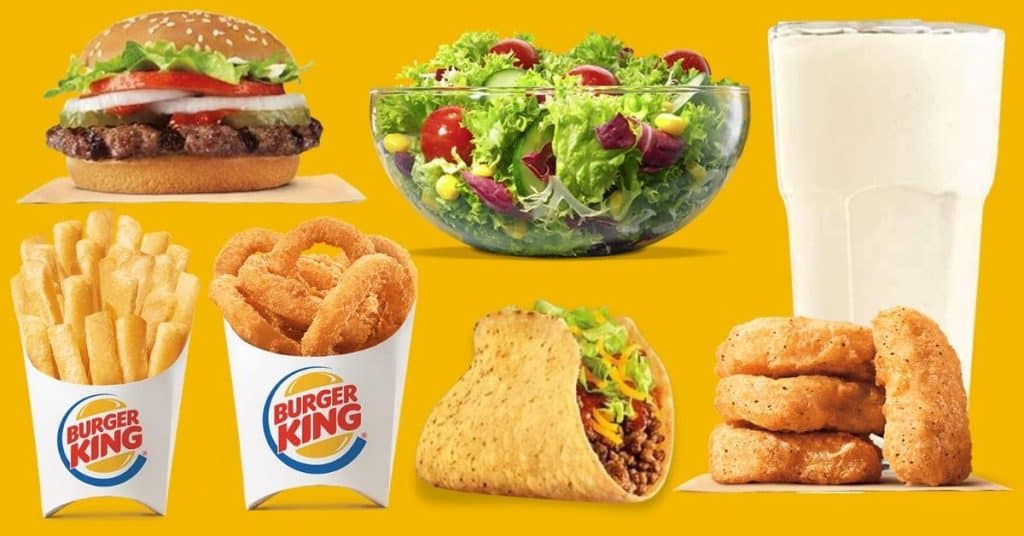
Burger King is famous for its flame-broiled burgers, especially its Whoppers, but they do also have chicken sandwich options, one fish burger, a plant-based Whopper, and a few breakfast items.
Burger King also has salads, but they only have three compared with the eleven that McDonald’s has on their menu. Additionally, Burger King salads have almost as much fat as a McDonald’s burger, even without the dressing.
I reviewed the 30 main burgers and sandwiches (beef, chicken, fish and plant-based) from Burger King to evaluate their nutritional information and here’s what I found:
The average nutritional information for the 30 main menu items is 684 calories with 44g of carbs (1.8g fiber), 42.2g fat (14.2g saturated), 33.2g protein, and 1152mg of sodium.
Key Takeaway: Burger King burgers are higher in calories (+185), sodium (+95 mg) and fat (+19g) than the average burger at McDonald’s; in fact, they have nearly double the amount of saturated fat (+7g) than a McDonald’s burger. The only benefit of a Burger King burger is a higher protein content (+5g).
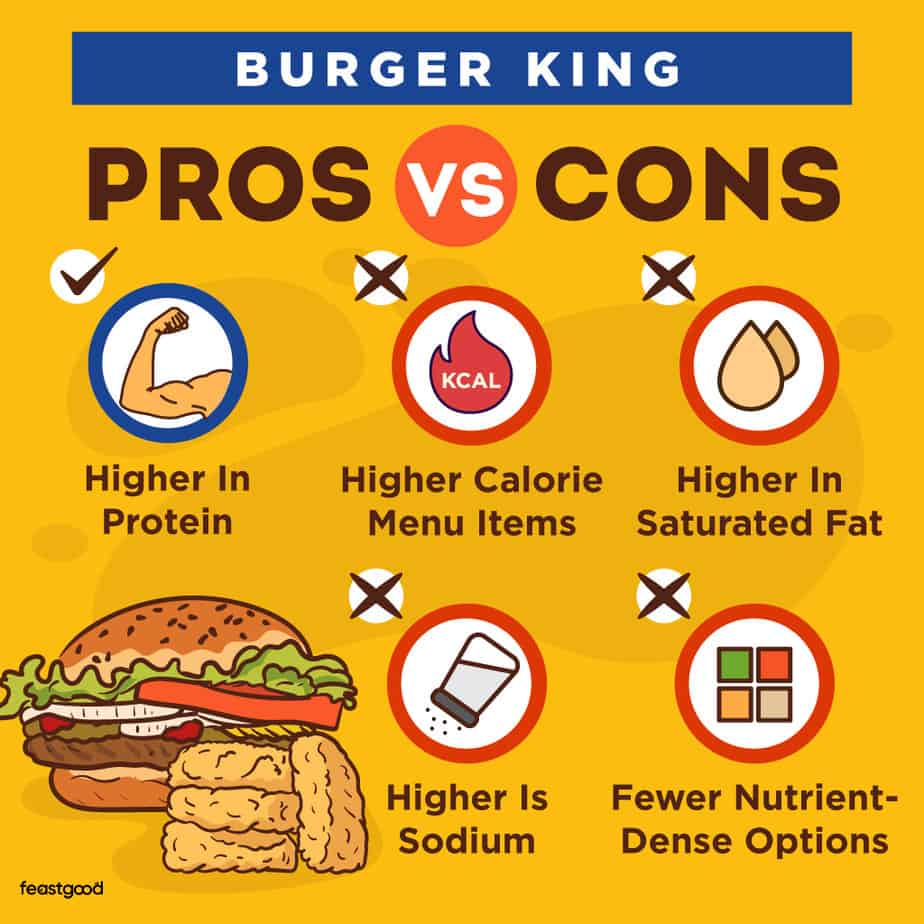
Pros
- Higher In Protein
Cons
- Higher Calorie Menu Items
- Higher In Saturated Fat
- Higher Is Sodium
- Fewer Nutrient-Dense Options
Comparing McDonald’s & Burger King: Which is Healthier?
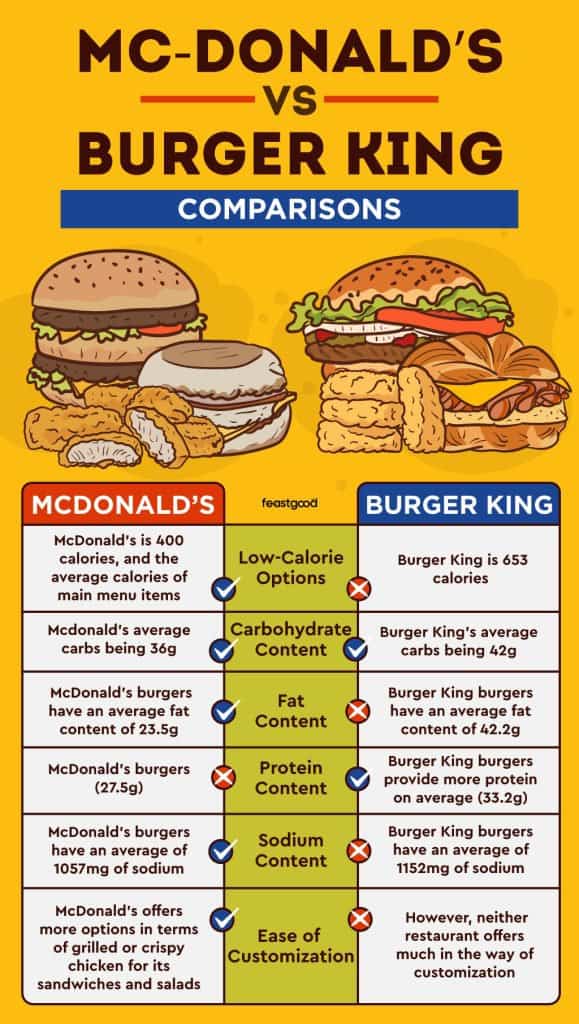
To determine whether McDonald’s or Burger King is healthier, I compared them across the following nutritional categories:
- Low-Calorie Options
- Carbohydrate Content
- Fat Content
- Protein Content
- Sodium Content
- Ease of Customization
Check out more restaraunt comparisons on our Fast Food Fitness page where we explore how to stay on track with your goals while on-the-go.
Low-Calorie Options
The average calories of main menu items at McDonald’s is 400 calories, and the average calories of main menu items at Burger King is 653 calories; therefore, McDonald’s has more low-calorie options on its main menu than Burger King.
The main reason why McDonald’s has more low calorie options than Burger King is because their burgers and salads are lower in calories than Burger King’s. Additionally, McDonald’s has snack wraps and more salad options on their menu than Burger King does.
The average burger at McDonald’s is 498 calories and the average burger at Burger King is 684 calories (+186 calories). This means that Burger King burgers are 37% higher in calories than McDonald’s burgers.
The average salad from McDonald’s is 230 calories and the average salad at Burger King is 347 calories (+117 calories), which means that Burger King salads are 51% higher in calories than McDonald’s salads.
McDonald’s has eleven salad options, and the salads can be served plain (123 calories per serving), with grilled chicken (267 calories per serving) or with crispy chicken (377 calories per serving).
Additionally, Burger King has only three salad options and two of them are made with crispy (fried) chicken (490 calories per serving), which has 223 more calories than McDonald’s grilled chicken salads. There is no option to get grilled chicken at Burger King.
The Winner: McDonald’s
- The winner for the most low-calorie options is McDonald’s, because their menu has more low-calorie options than Burger King does.
Carbohydrate Content
On average, both McDonald’s and Burger King are similar in their carbohydrate content across their main menu items, with the average carbs being 36g at McDonald’s and 42g at Burger King.
McDonald’s & Burger King burgers both have an average of 44g of carbs. McDonald’s snack wraps provide a slightly lower carb option with 39g of carbs per serving.
McDonald’s salads average 19g of carbs and Burger King’s salads average 22g of carbs.
The lowest carb menu item at McDonald’s is the garden side salad (4g carbs) and the lowest carb menu item at Burger King is also the garden side salad (3g carbs).
The single highest carb menu item at McDonald’s is the 32oz Chocolate Triple Thick Shake with 203g of carbs and the highest carb menu item at Burger King is a 38oz serving of root beer with 155g of carbs.
The Winner: Tie
- McDonald’s and Burger King menu items have essentially the same carbohydrate content across their menu items; therefore, it’s a tie.
Fat Content
The menu items that are highest in fat at both McDonald’s and Burger King are their burgers, but McDonald’s burgers have an average fat content of 23.5g and Burger King burgers have an average fat content of 42.2g.
So you can see that a burger from Burger King has almost double the amount of fat compared to McDonald’s burger.
Even more concerning, the saturated fat content at Burger is on average 14.2g compared with 7.5g at McDonald’s. The American Heart Association recommends that only 5-6% of calories come from saturated fat. Based on 2000 calories per day, this would be about 13g of saturated fat.
Therefore, one burger from Burger King would exceed the total recommended saturated fat intake for an entire day.
Most of McDonald’s main menu items have 0-10g of saturated fat, whereas most of Burger King’s main menu items have more than 10g of saturated fat. Burger King even has burgers with more than 30g of saturated fat.
The Winner: McDonald’s
- The winner for lower fat and lower saturated fat is McDonald’s.
Protein Content
At both McDonald’s and Burger King, the highest protein menu items are burgers, but Burger King burgers provide more protein on average (33.2g) than McDonald’s burgers (27.5g).
The lowest protein burger at McDonald’s is a regular hamburger with 12 grams of protein, and from Burger King the lowest protein burger is also a regular hamburger with 13 grams of protein.
The highest protein burger at McDonald’s is the Angus Bacon & Cheese with 45 grams of protein, and from Burger King the highest protein burger is the Triple Whopper Sandwich with cheese with 71 grams of protein.
Even the plant-based burger from Burger King, the IMPOSSIBLE Whopper, has more protein (25g) thanthe McDonald’s McPlant burger, which has 19g of protein.
The Winner: Burger King
- The winner for the restaurant with the highest protein content is Burger King, because it has higher protein menu items than McDonald’s.
Sodium Content
The highest sodium menu items at Burger King and McDonald’s are their burgers, but Burger King burgers have an average of 1152mg of sodium and McDonald’s burgers have an average of 1057mg of sodium.
With a value of around 1100mg for a single burger or sandwich, you’re looking at 48-73% of the total daily recommended intake for sodium from one item. So it’s fair to say that the average burger from both of these restaurants isn’t considered healthy.
However, McDonald’s burgers are slightly lower in sodium than Burger King’s burgers, which makes them slightly better in this category.
The salads at both Burger King and McDonald’s are lower in sodium than the burgers. McDonald’s salads have an average of 572mg of sodium without dressing.
However, a single packet of dressing nearly doubles that amount, with an average of 566mg of sodium.
Burger King salads have an average of 802mg of sodium without dressing. But, the dressings at Burger King are lower in sodium than the dressing at McDonald’s, with an average of 280mg of sodium.
A McDonald’s salad with dressing averages 1138mg of sodium whereas a Burger King salad with dressing averages 1082mg of sodium. This puts the sodium content back up around 1100mg, the same as the burgers.
If you’re looking for lower sodium options from these restaurants, check out these other articles:
- Best Low-Sodium McDonald’s Meals
- Best Low-Sodium Burger King Meals
The Winner: Burger King
- The winner for lowest sodium content for main menu items is McDonald’s because their menu items have less average sodium than Burger King’s main menu items.
Ease of Customization
McDonald’s offers more options in terms of grilled or crispy chicken for its sandwiches and salads. However, neither restaurant offers much in the way of customization.
At both McDonald’s and Burger King, some toppings and condiments can be added or removed from burgers (for example no cheese and no pickle), but options to customize beyond that are limited.
The Winner: McDonald’s
- McDonald’s has a slight edge over Burger King in terms of customization because it provides options for either grilled or fried (crispy) chicken.
Similar Meals: Head to Head Comparison
Let’s see how similar menu items from McDonald’s and Burger King compare to see which version is the healthiest.
McDonald’s Egg McMuffin vs. Burger King CROISSAN’WICH Ham, Egg & Cheese
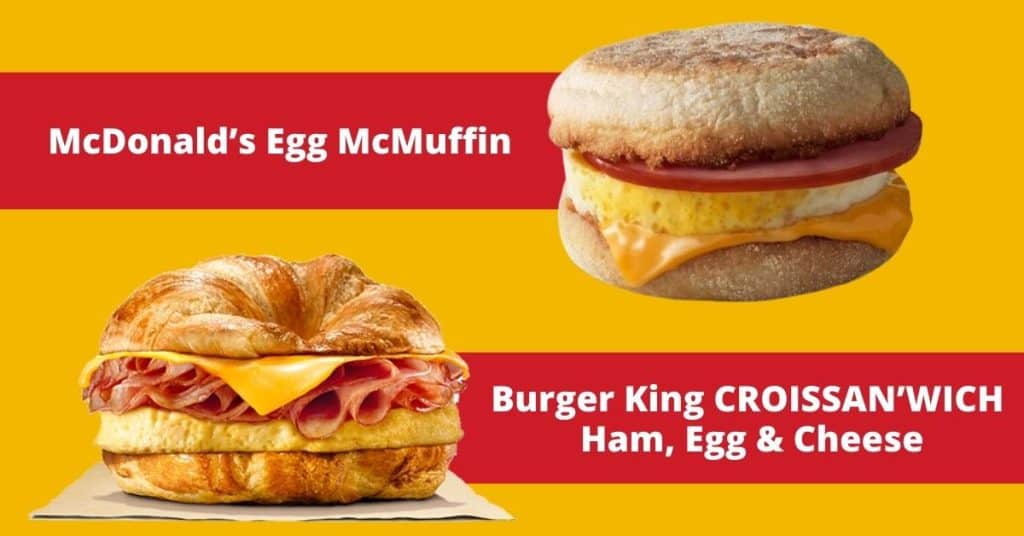
| Nutrition Info | McDonald’s Egg McMuffin (includes ham) | Burger King CROISSAN’WICH Ham, Egg & Cheese |
|---|---|---|
| Calories | 300 | 370 |
| Carbs | 30g | 30g |
| Fat | 12g | 19g |
| Protein | 18g | 17g |
| Sodium | 820mg | 1030mg |
The McDonald’s Egg McMuffin is lower in calories, fat and sodium, and is higher in protein.
The Winner: McDonald’s
- Overall, the McDonald’s Egg McMuffin is a healthier choice than the CROISSAN’WICH Ham, Egg and Cheese from Burger King.
McDonald’s Premium Caesar Salad with Crispy Chicken (no dressing) vs. Burger King Garden Salad with Crispy Chicken (no dressing)
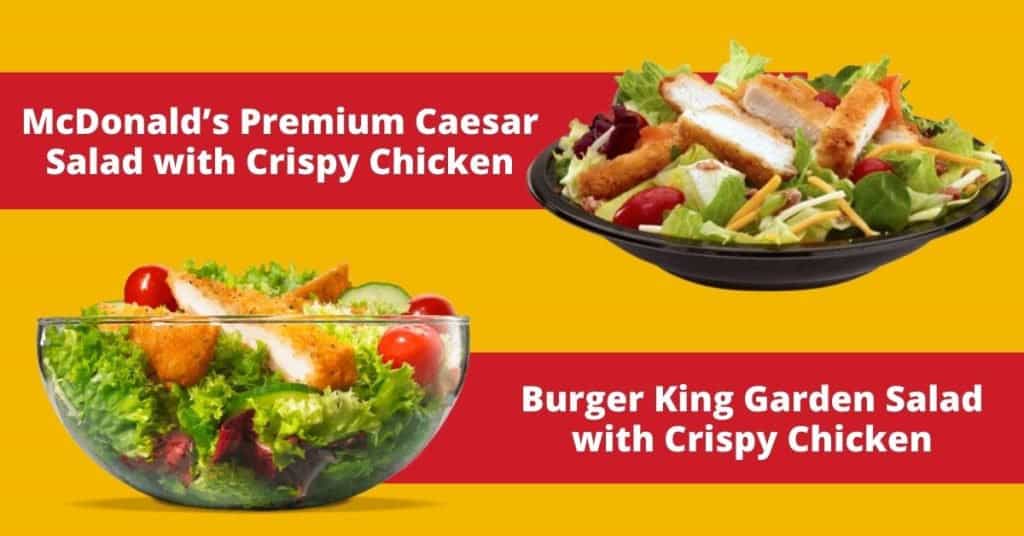
| Nutrition Info | McDonald’s Premium Caesar Salad with Crispy Chicken | Burger King Garden Salad with Crispy Chicken |
|---|---|---|
| Calories | 330 | 440 |
| Carbs | 20g | 31g |
| Fat | 17g | 25g |
| Protein | 26g | 25g |
| Sodium | 840mg | 930mg |
McDonald’s Premium Caesar Salad with Crispy Chicken is lower in calories, carbs, fat and sodium than the Burger King Garden Salad with Crispy Chicken, and yet still offers 1g more protein.
The Winner: McDonald’s
- Overall, the McDonald’s Premium Caesar Salad with Crispy Chicken is a healthier option than the Burger King Garden Salad with Crispy Chicken.
McDonald’s Chicken McNuggets (4 piece) vs. Burger King’s Chicken Nuggets (4 piece)
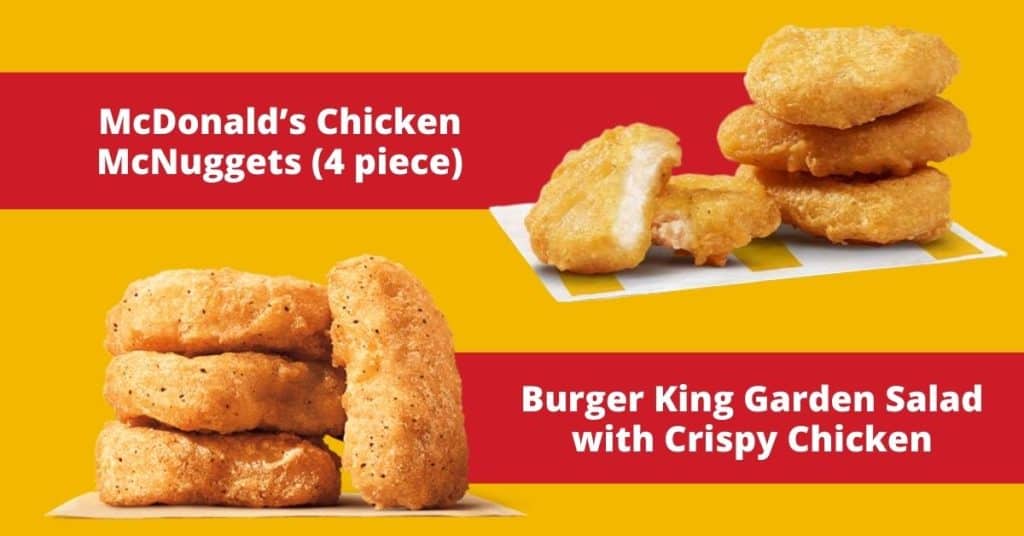
| Nutrition Info | McDonald’s Chicken McNuggets (4 piece) | Burger King Chicken Nuggets (4 piece) |
|---|---|---|
| Calories | 190 | 170 |
| Carbs | 12g | 11g |
| Fat | 12g | 11g |
| Protein | 9g | 8g |
| Sodium | 360mg | 310mg |
The four-piece chicken nuggets at Burger King are lower in calories, carbs, fat and sodium than the four-piece chicken nuggets at McDonald’s, but McDonald’s nuggets do offer 1g more protein.
The Winner: Burger King
- Overall, the Burger King 4-piece chicken nuggets is a healthier option than the McDonald’s 4-piece chicken nuggets.
McDonald’s Big Mac vs. Burger King Whopper
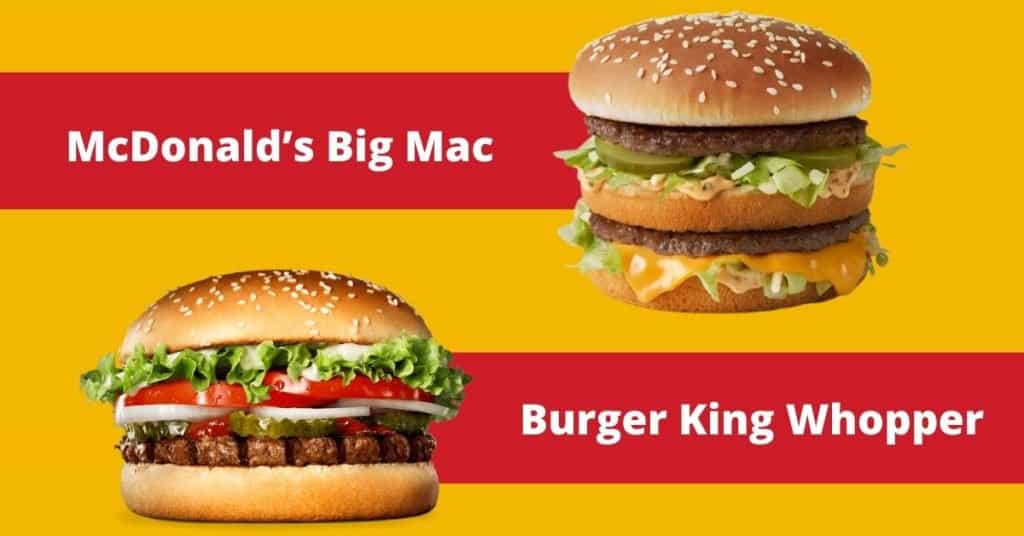
| Nutrition Info | McDonald’s Big Mac | Burger King Whopper |
|---|---|---|
| Calories | 540 | 660 |
| Carbs | 45g | 49g |
| Fat | 29g | 40g |
| Protein | 25g | 28g |
| Sodium | 1040mg | 980mg |
The McDonald’s Big Mac signature sandwich is lower in calories, carbs and fat than the Burger King Whopper sandwich.
However, the Whopper is lower in sodium and higher in protein.
The Winner: McDonald’s
- Overall, the McDonald’s Big Mac is a healthier option than the Burger King Whopper for most people because it’s significantly lower in fat, which is mainly saturated fat.
However, for those with high blood pressure and/or those who have been advised to reduce their sodium consumption, the Whopper may actually be a better option.
Healthy Meal Options At McDonald’s and Burger King
McDonald’s and Burger King both have a number of healthier meal options if you know what to order.
Healthy Meal Options from McDonald’s
My top 3 recommendations for healthy meals at McDonald’s are:
- Egg McMuffin + Fruit’n Yogurt Parfait
- Premium Southwest Salad with Grilled Chicken
- Hamburger + Small Fry +Side Salad with Low-Fat Balsamic Dressing
1. Egg McMuffin + Fruit ‘n Yogurt Parfait
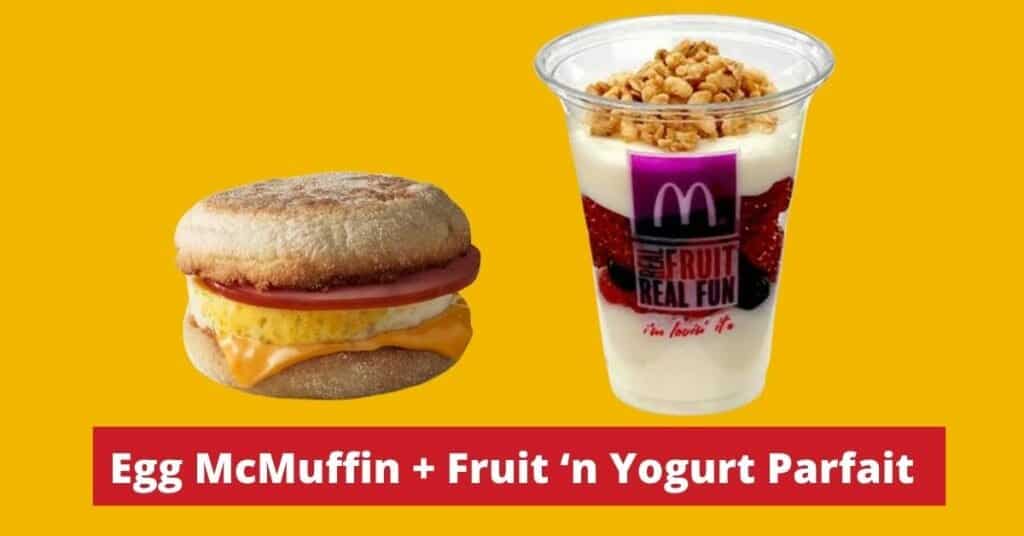
The Egg McMuffin is a balanced option that is relatively low in calories (300 calories), and provides a good amount of protein (18 grams), which can keep you full for longer periods.
Adding a fruit and yogurt parfait provides additional protein (4 grams) from the yogurt and vitamins and fiber from the fruit for an added nutrient boost to make this a more balanced meal.
The overall meal is 460 calories, with 61g of carbs, 22g of protein, and 14g of fat. Total sodium content is 905mg.
2. Premium Southwest Salad with Grilled Chicken
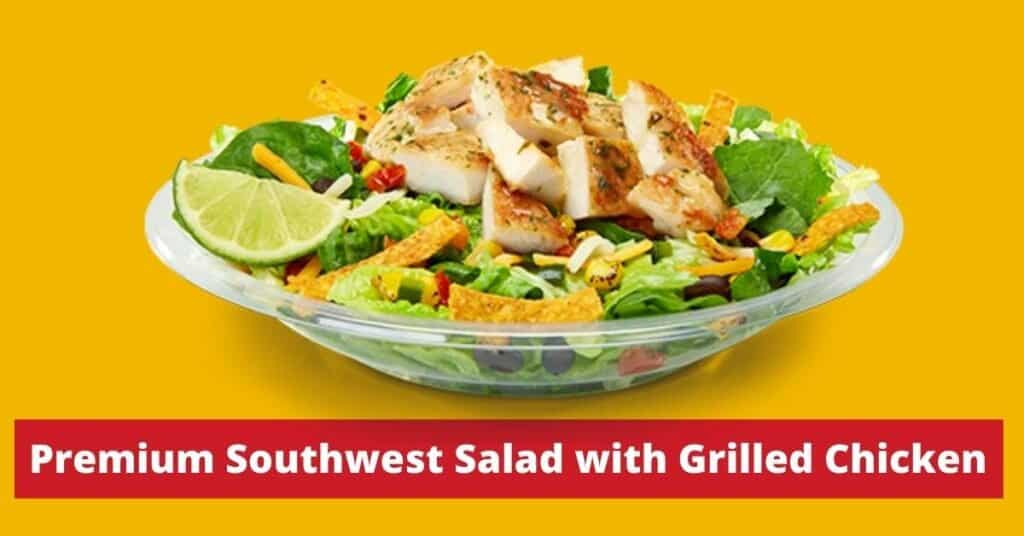
The Premium Southwest Salad with Grilled Chicken is a healthy option because it’s loaded with vitamins, minerals, and fiber from the vegetables and the grilled chicken is an excellent source of protein to keep you satisfied for longer.
The southwest salad with grilled chicken has 320 calories, with 30g of carbs, 30g of protein, and 9g of fat, and 960mg of sodium without salad dressing.
Adding Newman’s Own Creamy Southwest Dressing adds 100 calories, with 11g of carbs, 1g of protein, and 6g of fat. The dressing does have 340mg of sodium, so it’s best to skip it if you’re trying to reduce your sodium intake.
In total, the salad and dressing is 420 calories, with 41g of carbs, 31g of protein, 15g of fat and 1300mg of sodium.
3. Hamburger + Small Fries + Side Salad
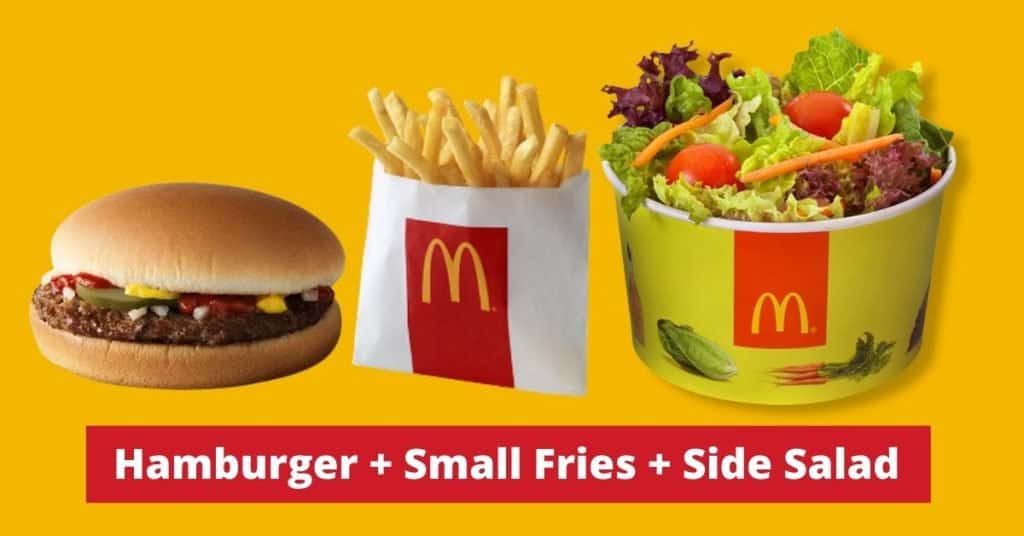
Another healthy option from McDonald’s is to pair a burger and fries with a side salad, because the burger and fries will provide the carbs, fats, and protein and the side salad will add vitamins, minerals, and fiber that would otherwise be lacking.
For this entire meal there are 540 calories, with 78g of carbs, 16g of protein, 23g of fat, and 615mg of sodium. It should be noted that this includes McDonald’s Newman’s Own Low Fat Balsamic Vinaigrette dressing.
While this meal is fairly high in carbohydrates and lower in protein, it can still be healthy in the context of an overall day. If I were to eat this meal for lunch, then I would ensure that my other meals of the day were higher in protein and slightly lower in carbs so that it all balanced out.
It’s a satisfying amount of food volume when you consider that ordering a regular hamburger and fries and a salad all adds up to the same number of calories as a Big Mac by itself (540 calories).
Related Article: Eating at McDonald’s When Bulking or Cutting (6 Meals)
Healthy Meal Options from Burger King
My top 3 recommendations for healthy meals at Burger King are:
- CROISSAN’WICH Egg & Cheese + Fat-free Milk + Applesauce
- Chicken Nuggets + Fat-free Milk + Side Salad
- Double Hamburger + Side Salad with Lite Honey Balsamic Vinaigrette
1. CROISSAN’WICH Egg & Cheese + Fat-free Milk + Applesauce
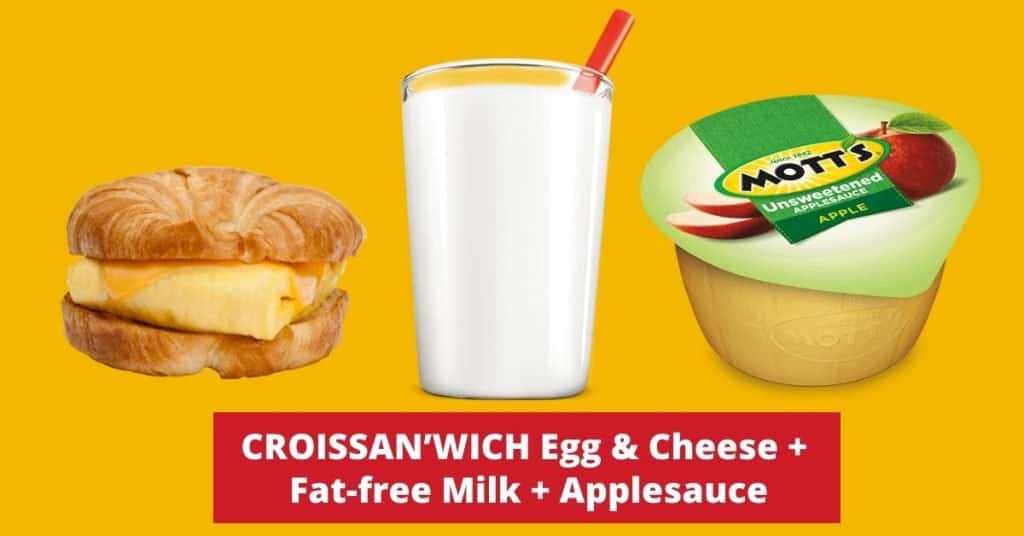
One healthy meal option from Burger King is the Egg & Cheese CROISSAN’WICH paired with fat-free milk for additional protein and applesauce for a nutrient boost.
The CROISSAN’WICH on its own provides more grams of fat (18g) than it does protein (12g), so I paired it with fat-free milk (9g protein) to boost the protein content with no added fat.
Burger King doesn’t have any fresh fruit options, so adding a container of applesauce is the only way to add fruit to this meal to get some additional vitamins. One serving of applesauce has 50 calories, with 13g of carbs (no protein, fat or sodium).
The overall meal is 480 calories, with 55g of carbs, 21g of protein, and 18g of fat. Total sodium content is 735mg.
2. Chicken Nuggets + Fat-free Milk + Side Salad
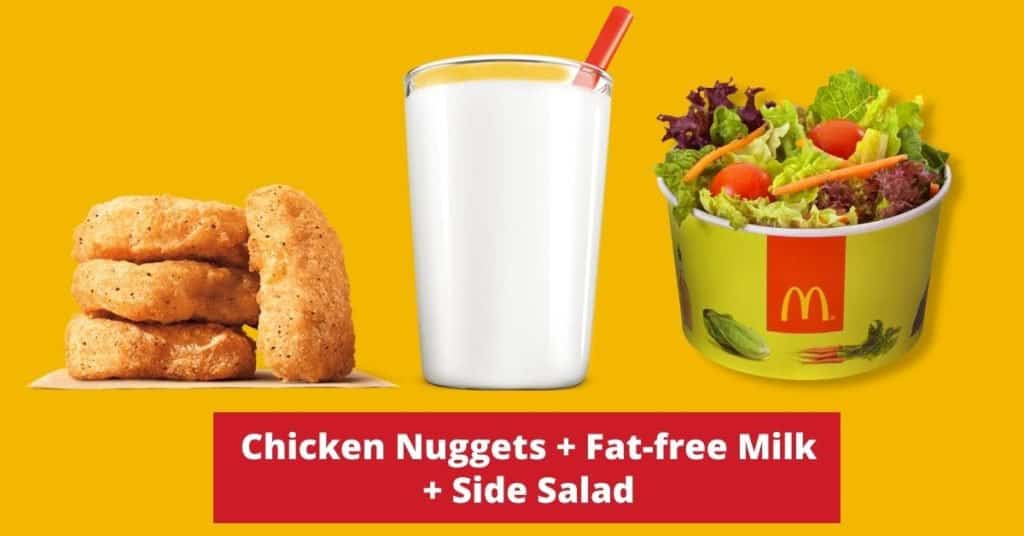
Another healthy meal option from Burger King are the chicken nuggets paired with fat-free milk for more protein and a side salad for additional nutrients.
Once again, I’m using the trick of adding fat-free milk as a way to boost the protein content of this meal without also increasing the fat content. A simple side salad (no dressing) balances it all out for a colorful and nutritious plate.
If you’re someone who doesn’t enjoy milk or is lactose intolerant then you could keep the protein content lower and just focus on prioritizing higher protein foods in your other meals of the day.
In total, the meal provides 320 calories, with 27g of carbs, 21g of protein, and 15g of fat, and 530mg of sodium.
3. Double Hamburger + Side Salad with Lite Honey Balsamic Vinaigrette

The last healthy meal from Burger King that I would recommend is their Double Hamburger paired with a side salad, which provides all the nutrients you need for a balanced meal.
The double hamburger is a better option than the regular hamburger because it provides more protein than fat as it includes two patties instead of one. The regular hamburger has 13 grams of protein, but the double hamburger has 21 grams of protein.
The hamburger, side salad, and dressing together have 530 calories, 43g of carbs, 25g of protein, 26g of fat, and 725mg of sodium.
You can reduce the sodium and fat content of the meal if you want to by omitting the salad dressing, or using only half a serving. One serving of this salad dressing has 120 calories, with 14g of carbs, 8g of fat, and 220mg of sodium.
Related Article: What to Eat at Burger King When Bulking or Cutting
Final Thoughts
Overall, McDonald’s is a healthier fast food option than Burger King because it has lower calorie options with less fat and sodium than Burger King.
What To Read Next:
- Which Is Healthier Chick-Fil-A or McDonalds?
- Which is Healthier: McDonald’s or Subway?
- Which is Healthier: McDonald’s or KFC?
- Which Is Healthier Chick-fil-A or Panda Express?
- Which Is Healthier Subway or Taco Bell?
About The Author

Lauren Graham is a Precision Nutrition Level 1 certified nutrition coach. She focuses on helping busy professionals balance healthy eating and purposeful movement. Lauren has a background in competitive swimming and is currently competing as a CrossFit athlete. She has a passion for training, teaching, and writing.
Why Trust Our Content

On Staff at FeastGood.com, we have Registered Dietitians, coaches with PhDs in Human Nutrition, and internationally ranked athletes who contribute to our editorial process. This includes research, writing, editing, fact-checking, and product testing/reviews. At a bare minimum, all authors must be certified nutrition coaches by either the National Academy of Sports Medicine, International Sport Sciences Association, or Precision Nutrition. Learn more about our team here.
Have a Question?
If you have any questions or feedback about what you’ve read, you can reach out to us at [email protected]. We respond to every email within 1 business day.
